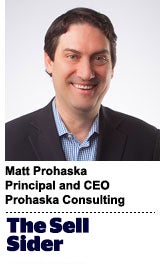“The Sell Sider” is a column written by the sell side of the digital media community.
Today’s column is written by Matt Prohaska, principal and CEO at Prohaska Consulting.
The quote in the headline, echoed by numerous political pundits, typifies the overreaction during and after the United States’ Election Day. Like many watching election results on that Tuesday night, I thought how badly the pollsters got it wrong, again.
Yes, presidential election polling has flaws – just read here, here, here and 25 other places for all the critiques and fun handwringing.
Has Nate seen enough?
— Nate Silver (@NateSilver538) November 6, 2020
But remember, polling is near-impossible to be perfect, since under 100% of those surveyed tell the truth, or make themselves available to pollsters, or do exactly what they said they were going to do. These discrepancies make an accurate representation of what is likely to happen very difficult, which is partially why there are margin of error footnotes.
While polling before an event happens is different from measuring the results, there are some analogies and takeaways for the marketing and advertising industry, progressing toward a brave new world in identity and measurement.
Think about people that tell pollsters they support one candidate when they actually support another, because they don’t want to say who they really are voting for. Then think about folks that turn off their Nielsen meters when they binge-watch “Love Island,” but not when they watch PBS.
Still, I applaud Nielsen’s recent announcement incorporating new data sets into its currency, as an important step toward bridging linear and addressable and getting us closer to a more fair and accurate representation of what worked where and when and by how much.
Fix your identity first, measurement and attribution second
Just as Americans live in two different countries, we operate globally today in two different ad ecosystems, one with walled gardens and one without.
Google, Facebook and Amazon continue to crush it because they have two things in spades that thousands of other publishers don’t have: identity accuracy and measurement ownership. Both Google studies and our own projections from publisher clients show that publishers risk losing 30% to 50% of their revenue in a post-cookie world if nothing else replaces it.
While many push on panels and focus their business models around a hashed email (or HEM cookie as we call it) for a fully-deterministic open web, we know that won’t completely scale and so , despite Nielsen’s claim that polls can be used to extrapolate conclusions more broadly, publishers will need to mix a cocktail of deterministic, probabilistic and contextual options to present fully-scaled choices to their advertisers. Only then will marketers be able to properly measure and attribute success and failure more accurately and equitably, so publishers across all media channels get their fair share.
What you can do
As we said during AdExchanger’s Programmatic IO last month, publishers and brands need to take important steps now to fully own their identity strategy, playbook, partner landscape, audience relationship and first-party assets.
Otherwise, publishers will lose even more market share to the Big Three, and brands with their agencies will continue to spend where there is more accuracy, more personalization and less risk. This is the danger of publishers not knowing their audiences’ behavior and performance as much as the Big Three, or even their advertisers, do today.
Polling, like measurement, can be very helpful and misleading if sources and methodology are inaccurate with incorrect identity. Imagine politicians spending all their campaign time and money in places where their votes are already secured, missing out on key states and counties that could actually make a difference.
Publishers and brands risk losing their own elections, resulting in publishers struggling not just to thrive but survive. No matter how you feel about the presidential election outcome, losing more and more publishers, and the open web as we know it, are threats to democracies we should all want to avoid.
Follow Prohaska Consulting (@TeamProhaska) and AdExchanger (@adexchanger) on Twitter.














